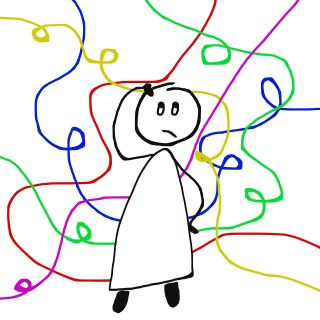Fear
Finding Meaning in the Mayhem
Prepare yourself psychologically for disruption.
Updated July 26, 2023 Reviewed by Abigail Fagan
Key points
- Mayhem refers to the act of destruction as well as the ensuing disorder, chaos, and confusion.
- Mayhem can lead to the loss of stability and connection.
- People can prepare for mayhem psychologically by searching for deeper meaning and more authenticity.

Mayhem: A word that we rarely use in our everyday conversations but that nevertheless describes the state of affairs in our world today. Mayhem refers to the act of destruction as well as the ensuing disorder, chaos, and confusion.
Mayhem can be the result of conflicting policies whose impacts were not well thought through, leading to confusion and loss of stability. For example, the recent COVID pandemic policies that encouraged people to work from home may have been beneficial for public health but now these same policies are creating conflict. Many leaders want employees to return to the office to work face-to-face with their colleagues, while some employees remain adamant that they be allowed to continue to work remotely.
Mayhem can also be designed on purpose. For example, terrorist groups engage in violence and destruction in order to gain power over others through fear. In some parts of the world, leaders know that starting a war or limiting the supply of food will result in large numbers of people needing to migrate across borders or follow their commands in order to survive. While different situations result in different complications, we should not be surprised that certain policies deliver the same results, the same chaos and disorder, year after year, decade after decade.
We are headed for more turbulent times. Mayhem can be observed in the growing numbers of refugees and homeless encampments; in rising costs for farming, food, fuel, electricity, and housing; in chaos at airports and ports; in growing inequality between rich and poor; in widespread hunger and lack of clean water; in rising rates of addiction and depression; in unemployment driven by AI and other technologies; in growing hate, envy, and anger amongst so many groups sensing division, oppression, and injustice; in crumbling infrastructure not only in cities but also in the social fabric that previously bound our communities together; and so on.
We can see the same issues cropping up in different countries along with the same ineffective responses. There are too many issues that need to be addressed by too few people who have the capacity (skills, resources, and time) to solve them. The problems are growing too large for one state or even nation to handle. This may intensify the call for coordinated international, centralized efforts to instill order. These efforts may be embraced by some, while others may become even more angry as they feel more controlled.
Our first reaction to this current and potentially future mayhem may be fear. When we are confused, when we don’t know what is real and what is not, when our sense of stability is uprooted, fear is bound to creep in. Fear is a reflection of tension in our psyche and often results in us seeking comfort by narrowing our choices and limiting any thoughts of exploring future possibilities.1 Often, fear is like a narcotic that lulls us into inaction.
You may want to prepare yourself psychologically for more fear and mayhem in the world. Start today to find deeper meaning in your life by:
1. Realizing what you can control and what you cannot
During times of confusion, it is important to recognize what you can and cannot control. In my book, Prisoners of Our Thoughts, I share a relevant passage:
Between stimulus and response, there is a space.
In that space lies our freedom and our power to choose our response.
In our response lies our growth and our happiness.2
These three lines underscore that we always have the choice to decide how to respond to whatever happens to us. We need to know that we can deal with whatever comes our way and not let excessive fear get in our way.
2. Move toward living a simpler, more authentic life
Now, more than ever is the time when we must trust our intuition and move toward living a more authentic life. Take time to know yourself3. Know your boundaries (for example: I am this, I agree with this, I do not agree with that). Spend time reflecting on how you want to fit into this world.
3. Focus on meaningful relationships.
We are meant to live in community, not alone. In a world of mayhem, you may feel like you are adrift, but community can serve as an anchor in this storm. Revive your sense of community and focus on being more authentic with others.
We are now in the "mayhem age" — a time of much chaos and instability. Now more than ever, each of us must reestablish our ties to our own sense of being, our sense of authentic connection, and our sense of how we will find meaning in this confusing new world.
References
1. Pattakos, Alex and Dundon, Elaine (2017). Prisoners of Our Thoughts: Viktor Frankl’s Principles for Discovering Meaning in Life and Work, Berrett-Koehler, Oakland, CA, USA. p. 71.
2. Pattakos, Alex and Dundon, Elaine (2017). Prisoners of Our Thoughts: Viktor Frankl’s Principles for Discovering Meaning in Life and Work, Berrett-Koehler, Oakland, CA, USA. p. x.
3. Pattakos, Alex and Dundon, Elaine (2015). The OPA! Way: Finding Joy & Meaning in Everyday Life & Work, BenBella Books, Dallas, TX, USA. See Chapter 6.


